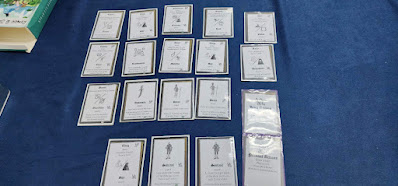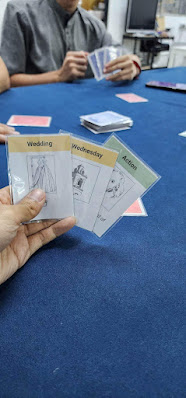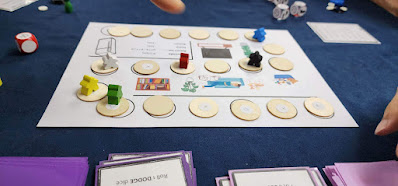TTGDMY (Tabletop Game Designers of Malaysia) is the largest game designer community in Malaysia. One recent playtesting meet-up was on 25 Feb 2023, at Game Over Here, a boardgame cafe in Sunway. I'm not really a regular, but I do try to go as often as I can. Playtesting is key in designing games and I also want to help other local designers playtest their games.
We started around 3pm and finished after 7pm. This session was good. I managed to test three of my games. Also all the games by other designers I played that day were interesting to me. They felt fresh. My past playtesting experiences were spotty. Sometimes I see many games which don't feel original or bring nothing new to the table.
This one above is a game about playing pool (as in pocket billiards). You race against your opponent to hit all your balls into pockets. The balls are represented by cards. Whenever you pocket a ball, you trigger a special power, which you will usually try to use to position yourself for pocketing the next ball. If you use the powers and position your cue well, you can pocket many balls within the same turn. You feel very much like a pro pool player. Good pool players don't exchange turns much. They play well, plan well and make long streaks. It is a matter of not making mistakes. If you really can't pocket the next ball, you must try to position the balls on the table to make it hard for your opponent to make consecutive shots. This game feels highly thematic, and it's a short 18-card game!
This is yet another 18-card game about a king vs the peasantry. It is an asymmetrical 2-player microgame. When the king plays a card, it is always face-up and it becomes a guard. When the peasantry plays a card, it is always face-down. One of the cards in the game is an assassin, and the peasantry tries to use the assassin to kill the king. This only works when the king runs out of guards. Meanwhile, the king tries to hunt down the assassin. The general rule is whenever you use the power of a card, it is moved to the discard pile. That means if the king uses the power on a guard, he loses that guard and weakens his position. Players manipulate the deck because they need to know where the assassin is in order to be able to use it or to capture it.
This is one of my prototypes Romeo and Juliet. It is a secret identity team game. There are two factions in the game, Team Romance and Team Duty. Team Romance wants to Romeo and Juliet to be together, while Team Duty is against that. The former wins by bringing together three cards - Romeo, Juliet and Secret Ceremony. The latter wins by bringing together these three cards - Juliet, Wednesday (no, not this one) and Wedding. All this sounds rather abstract. The actual mechanism is simple. Players will be passing cards around the table and those on the same team try to first identify their teammates and then work together to assemble the winning combination.
This is a roll and write game about capturing monsters. It has a push-your-luck mechanism. The player board is constructed randomly using 9 tiles. Every player uses the same configuration. Every round you roll dice to determine how many and what types of fences you get to draw on your player board to surround and capture monsters. Monsters score points in different ways. Dice are rolled one by one and after each roll you can decide whether to pass and use the number of fences made available so far, or to hold on for another roll. There are two reasons to pass. If the total exceeds a threshold, you will end up building fewer fences. Also if you exit at a good time, you may get some bonus fences. Players need to decide simultaneously whether to pass or to press on. How many people pass at the same time affects the bonus fences you get. So there is some double guessing and greed assessment of your opponents.
This is a game about stealing snacks from the fridge. Dad fell asleep on the coach while watching TV. Are you able to sneak past him to get some midnight snack from the kitchen? I didn't get to play this. I was at the other table.
This is my prototype Catch 22. At the start of a round, every player draws three cards, looks at them, and arranges them face-down from smallest to largest. On your turn, you must reveal one card in front of another player, or from the top of the deck. As long as the sum of the revealed card values do not exceed 22, you gain a reward. The more face-up cards there are, the bigger the reward. If you go bust, i.e. reveal a card which pushes the total beyond 22, you are penalised instead.
This is Roadkill, a game with some dark humour. You play animal families trying to cross the highway. If you are not fast enough, you get run over by a car. Or a truck. But becoming roadkill is okay. In this game your specie has generational memory. When one family member dies, the others learn from it. You gain experience (the only currency in the game) which can then be used by the next family member attempting to cross the highway. In game terms, you try to cross all 6 lanes of the highway to get to the other side. On your turn you can either try to dash cross one lane, or do other things that help you on your next dash. If you die at any attempt, your pawn goes all the way back to the start. Your animal has just become roadkill so you now play the next family member trying to cross the road. This is quite exciting. It is frustrating and hilarious if you fail at your final attempt. You are going to have to start all over again.
In the past I rarely wrote about game prototypes. Prototypes are not released yet and no matter how good they are, you won't be able to buy them. Now that I'm doing game design myself, I want to share my journey and my experiences in the local game designer circle.








No comments:
Post a Comment